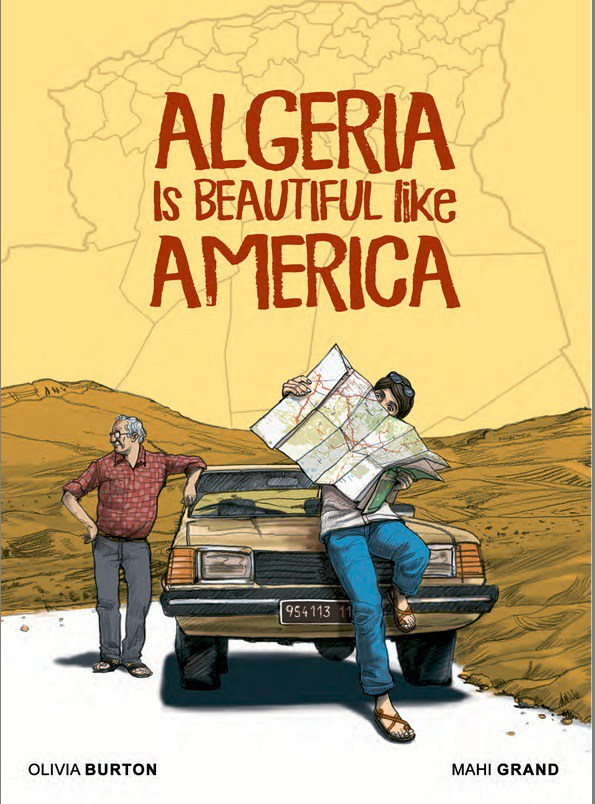This graphic novel focuses on a French woman’s search for her roots.
Algeria Is Beautiful Like America Hardcover – Olivia Burton (Author), Mahi Grand (Artist)
This type of graphic novel seems to resonate with me. I’ve already covered at least four different types of novels that focus on countries shaped by recent war. It seems that all of the 20th Century involved one kind of war or another.
So, Algeria: I had absolutely no idea about its recent history. Nor did I know about the Christian and Jewish settlers of French Algeria who had to immigrate to France after the Algerian War of Independence.
Olivia is the granddaughter of a Black Foot (“Pied-Noir”). The term is a mocking one, since the French used it to indicate that these people had arrived with their feet full of dust from the roads, escaping the war.
After her grandmother’s death, Olivia finds her journals and letters describing her homeland. Ten years later, she decides to travel to Algeria and experience the country for herself. All her family is scared for her, because Algeria is now a Muslim country, and a woman traveling alone can only attract danger.
In the end, nothing deters her. She finally arrives alone, with her grandmother’s postcards and letters in tow, and a single phone number in her pocket: an old man, Djaffar, is willing to act as her guide.
1. Facing the fact that you ended up on the wrong side of history can be tricky.
Olivia’s mother also lived in Algeria. She and her grandmother only had good memories of it: of their beautiful house, simple life, and vast land full of sheep. They did not involve themselves in politics much, but the family had a lot of land—a lot.
When they started fearing for their lives, they fled to Algiers, the capital. There, they had an apartment with a beautiful view of the sea. Once the war started its most virulent phase, they came back to France. Colonizers expelled from their colonies, yes, but also Algerians forced out of their own homes—a tricky memory.
2. Who we are is deeply rooted in where we come from.
A girl that has only listened to her families’ memoirs of their homeland can only conjure up a fragmented picture of her past. A pilgrimage can be enlightening in many ways, both good and bad, and this account is all about this type of discovery.
There is even a saying in Algiers: “If you don’t know where you’re going, it’s good to know where you come from”. This seems to summarize the plot perfectly.
3. The past is important, but it is also gone.
When Olivia finally arrives at her grandmother’s house, she takes the cell phone and calls her mom in France. Her mother starts crying, and this simple detail made me tingle. The house is boarded up, the tombs are desecrated, but the families that still live in some of the residences are very friendly and welcoming. They take her and Djaffar in, they provide food and shelter, and have kind words for her family, although the memories are almost gone. They used to work for them, but the French attended different schools. Sometimes, since it was such a small town, they would play together on the streets, but that would be about it.
4. War is a game-changer.
Take Djaffar’s story: he would have married to a good Muslim girl like his brother did, and ended up with great-grandchildren… but he also had to escape from the war. He faced shame and experienced cultural shock in France: learned about Marx and Freud, worked hard. When he returned, he was neither here nor there. That torn feeling is something akin to many immigrants.
My own mother came back to Syria with my grandmother in 2005, well before the actual war. My great-grandfather had arrived in Latin America at the beginning of the 20th century, and when he returned to Syria with all his family, the conditions had worsened. So he decided to leave again, never to come back.
The family that remained there treated my grandmother kindly and took her everywhere; after all, she had returned after 60 years! It was the trip of her life, something she still remembers proudly, especially the fact that she had never forgotten Arabic, her father’s language.
5. The land of our ancestors is rooted in our DNA.
We carry different fragments of it: sometimes we express it through food; sometimes we feel it in our thoughts and opinions, however subconsciously.
And sometimes, it is all about the landscape. Olivia’s mother had always wanted to retire to the countryside, but she never found the right spot. Now that her daughter is in Algeria, she suddenly realizes what her mother cannot find: her Algerian landscape, the wide mountains, the clear sky, and the flocks of sheep. For her mom, this is gone forever. And her nostalgia can be felt all throughout the book.
Algeria Is Beautiful Like America is available now.
Publisher: Diamond Book Distributors/Lion Forge
Publication date: April 24, 2018
ISBN: 9781941302569
Price: $24.99
Comics & Graphic Novels, Nonfiction (Adult)












